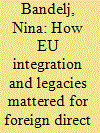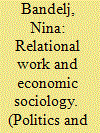|
|
|
Sort Order |
|
|
|
Items / Page
|
|
|
|
|
|
|
| Srl | Item |
| 1 |
ID:
095281


|
|
|
|
|
| Publication |
2010.
|
| Summary/Abstract |
This essay uses the case of foreign direct investment (FDI) in Central and Eastern Europe to stipulate how European Union (EU) integration affected the economic globalisation of the post-socialist region. Existing studies argue that expectations of impending EU membership had a direct effect on raising FDI inflows because they reduced perceived investment risks for potential investors. In contrast, I show that the EU accession process worked through an indirect effect on FDI: it influenced post-socialist states' efforts to promote FDI as a desirable strategy of economic development and the behaviour of firms. These state efforts, in turn, increased FDI inflows, net of conventional risk and return factors. Further analyses indicate that decisions about state FDI-promotion have been influenced not only by EU conditionality but also, and importantly, by particular legacies, namely the countries' initial choice of privatisation strategies, extent of reform during socialism and history of state sovereignty. Overall, the results suggest that EU integration and legacies of the past shape both the structural and the ideational context for domestic decision-making elites in Central and Eastern Europe, and may act not only as constraints but also as enabling conditions facilitating the global economic integration of the region.
|
|
|
|
|
|
|
|
|
|
|
|
|
|
|
|
| 2 |
ID:
113832


|
|
|
|
|
| Publication |
2012.
|
| Summary/Abstract |
This paper attempts to clarify the concept of relational work for understanding economic life as proposed by Viviana Zelizer. To do so, it first compares the concept to similar notions used in other disciplinary fields. Second, it reinterprets some exemplary economic sociology studies by using the relational work lens to clarify the concept's utility for empirical analysis. Third, it speculates about the place of relational work in the theoretical toolkit of economic sociologists, in particular its relation to embeddedness. The paper concludes by arguing for the utility of the concept to integrate structural, cultural, and power-focused analyses of economic life, to highlight the often-overlooked role of emotions in economic exchange, and to ground an alternative to rational action theory in economic sociology.
|
|
|
|
|
|
|
|
|
|
|
|
|
|
|
|
| 3 |
ID:
140430


|
|
|
|
|
| Summary/Abstract |
A unique dataset on bilateral investment treaties provides a novel source of evidence on the link between neoliberal globalisation and market transition. We argue that postsocialist countries of Europe and Eurasia, more than other developing regions in the world, signed such treaties to signal demand for foreign investment in the spirit of neoliberalism. We calculated the density of the whole BIT network since its inception in 1959 to 2009, and density and centrality of different regional blocks within it, and found strong support for our argument. Yet, even if bilateral investment treaties are designed to promote foreign direct investment, dynamic panel regression models show that signing them does not automatically translate into foreign direct investment inflows for postsocialist European and Eurasian countries in the 1990–2010 period.
|
|
|
|
|
|
|
|
|
|
|
|
|
|
|
|
|
|
|
|
|